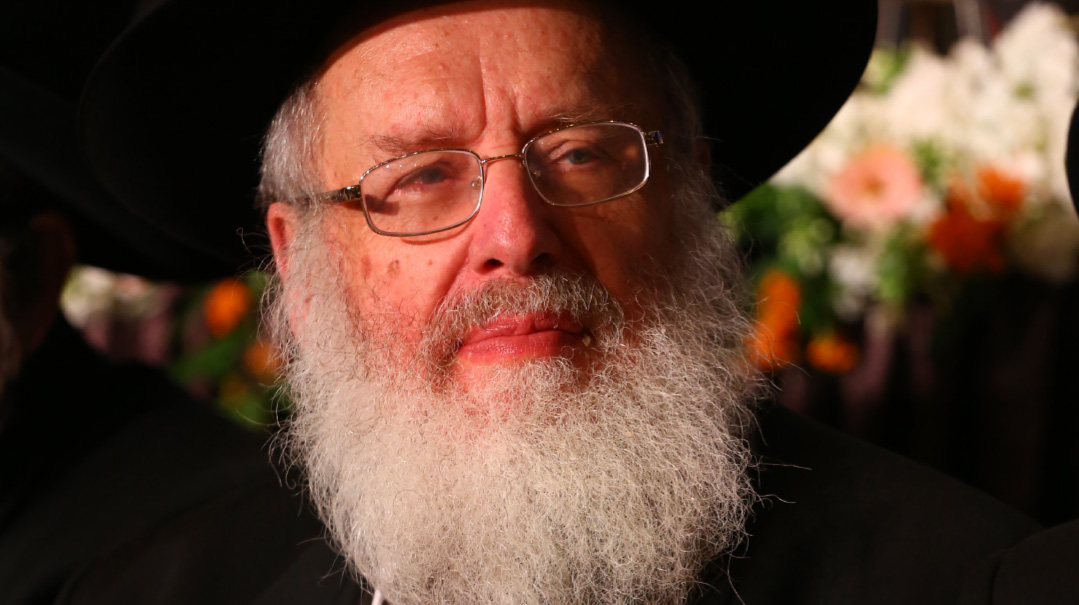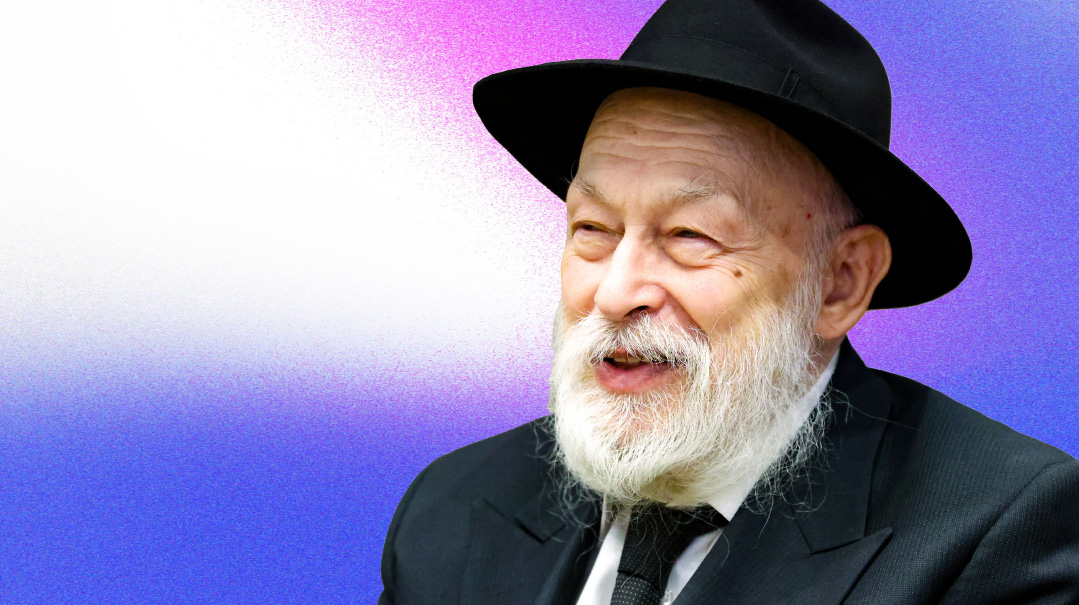Finger on the Pulse

With Rabbi Joey Haber's unique blend of Sephardi mesorah and a yeshivish education, he gracefully straddles different demographics while promoting life-enhancing messages common to us all
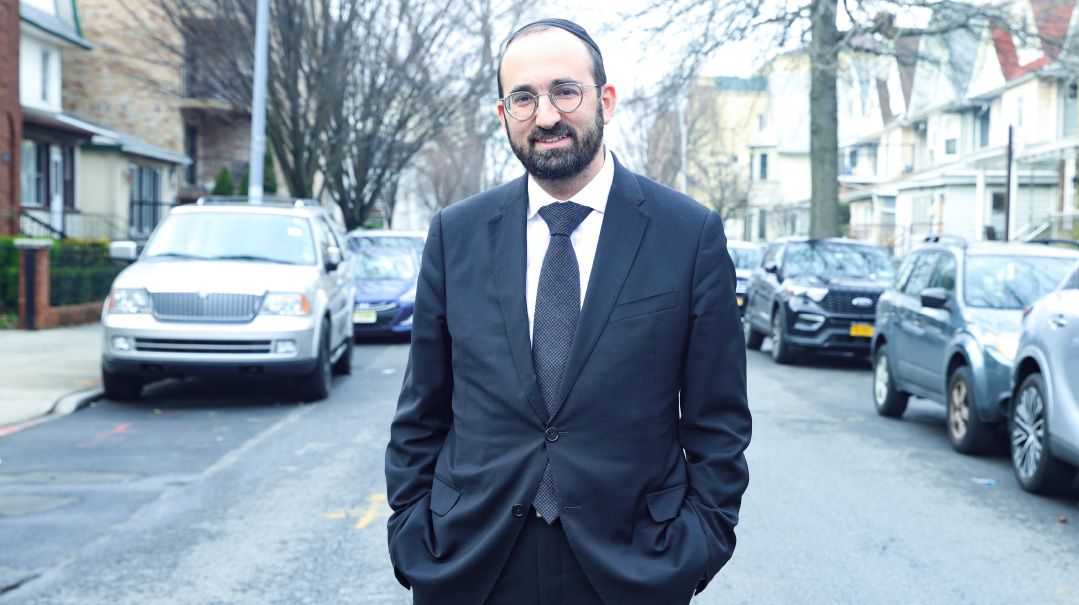
Photos: Jeff Zorabedian, Itzik Roytman
From advice on chinuch banim to shalom bayis to family finances, Rabbi Joey Haber has emerged as a popular address for the conflicts and conundrums many people face in an ever-challenging and confusing world. With Rabbi Joey’s unique blend of Sephardi mesorah and a yeshivish education, he gracefully straddles different demographics while promoting life-enhancing messages common to us all.
The most popular speaker at TAG’s Nekadesh event last June at the Prudential Center in Newark wasn’t a venerable Ashkenazic rav with a long beard. Instead, people in the audience found themselves riveted by a dynamic young Sephardi rav from Brooklyn. It wasn’t long before his speech about the dangers of technology had, ironically, gone viral.
Rabbi Haber was already a highly sought-after lecturer in the Syrian community, both in the US and abroad. But the asifah changed the game completely. Now he finds himself asked to speak to Jewish communities across the spectrum, not just about tech, but issues like chinuch, shalom bayis, shidduchim, and the challenges of a society focused on materialism. Personable, articulate, and impassioned, he has his finger squarely on the pulse of both the yeshivah community and his own Syrian kehillah.
“I’m very yeshivish, and I’m very Syrian,” he says when we meet at his Brooklyn home.
Currently the rav of the Magen David shul in Flatbush and the Beit Yosef shul in Deal during the summers, Rabbi Haber has been immersed in both Torah and the Syrian community since earliest childhood. Rabbi Joey grew up in Deal with his eight siblings, and his father, Rabbi Michael Haber, a talmid chacham and the author of many seforim, served as the rav of shuls in Brooklyn and Deal.
“My father is an incredible masmid totally devoted to the community,” Rabbi Haber says. “He often didn’t leave the shul until 11p.m.”
Rabbinic training for all the Haber boys began during the two-mile treks from their home to shul every Shabbos. “Going twice to shul on Shabbos meant we walked eight miles with my father,” Rabbi Haber says. “During that time we discussed divrei Torah and community issues, and it was a great rabbinic education. But my father never pushed us to become rabbanim. He only wanted to make sure we became lamdanim.”
But the senior Rabbi Haber’s example must have spoken louder than the words he didn’t say. Every single one of his sons became distinguished rabbanim in the Syrian community, his daughters married rabbanim, and all are as deeply involved in their community as their parents are.
Their mother, Molly, is likewise a role model of devotion to Torah and community. “I’d say she’s one of the top influential women in the Syrian community,” Rabbi Joey Haber says. “She does all kinds of chasadim — she teaches kallahs starting at nine in the morning and doesn’t finish till seven at night, and in between she’s taking calls and texts from people seeking her help and advice.”
The Haber sons were sent to the Lakewood Cheder for elementary school, which at the time still occupied the Legion Building and had only two classes per grade. (The sons of Rav Yerucham Olshin and Rav Dovid Schustal were among Rabbi Haber’s classmates.) After elementary school, the young Joey was sent to learn with Rav Reuven Feinstein in Staten Island for mesivta and beis medrash, and spent seven years there before going to Eretz Yisrael to learn under Rav Dovid Soloveitchik.
He married Marlene, who comes from the prestigious Shalom family (she’s the great-niece of Mr. Isaac Shalom, a philanthropist known for his efforts in building the infrastructure of the Syrian community and helping Sephardic communities around the world, which included bringing Sephardic boys from the Middle East to the Mirrer Yeshiva to learn.) The couple lived in Eretz Yisrael for a year before moving to Lakewood, where Rabbi Haber learned in BMG for ten years.
“My wife doesn’t care about externals,” Rabbi Haber says. “She’s happier when I spend four hours learning than when I give a speech to a crowd of any size.” She’s in and out as we speak, a serene presence providing a calm foil to her husband’s ceaseless activity.
Rabbi Haber left Lakewood to accept a position as a Hebrew dean at Magen David Yeshivah high school in Brooklyn, a job he’d retain for the next 16 years. “That job was my PhD in the Syrian community,” he jokes. It gave him extensive experience in chinuch and community issues, with an up-front view of the concerns and mindset of young people. It also honed his skills as a speaker: He’d give a 25-minute lecture to the boys once a week, and in his words, the talk had to be “crazy interesting” to keep their attention.
Recently, Rabbi Haber moved on to serve as lead rabbi at Kesher, a Sephardic organization he founded ten years ago to keep post-high school graduates connected to Torah. Kesher, which today boasts over 100 staff members, runs shiurim, events, Shabbat dinner learning for boys, and has recently opened a new division for girls, and a seminary called Naaleh.
The demand for his services as a speaker keeps him very busy, especially since the Nekadesh event heightened his visibility. Once a week he gives a shiur to women from his father’s shul that’s then uploaded to iTorah and TorahAnytime. Every other Shabbos he switches off with the rav of Shaare Zion, Rabbi Meir Yedid, to speak in the afternoon in the main sanctuary to over 700 people.
“But it’s hard to set limits,” he admits. “I always have this sense that I have to do more, that there’s more to be done. There’s a kind of chain reaction: I talk about something I’ve been seeing, I answer questions, then I see what else is on their minds and give a different talk, and that leads to even more questions and more speeches.”
Rabbi Haber is on the frontlines, advising people how to deal with the challenges of 21st century frum life, and we wanted to benefit from that as well. For our readers, Mishpacha presented him with some real-life scenarios, to offer readers a fly-on-the-wall view as he addresses contemporary issues with his unique perspective and incisive point of view.
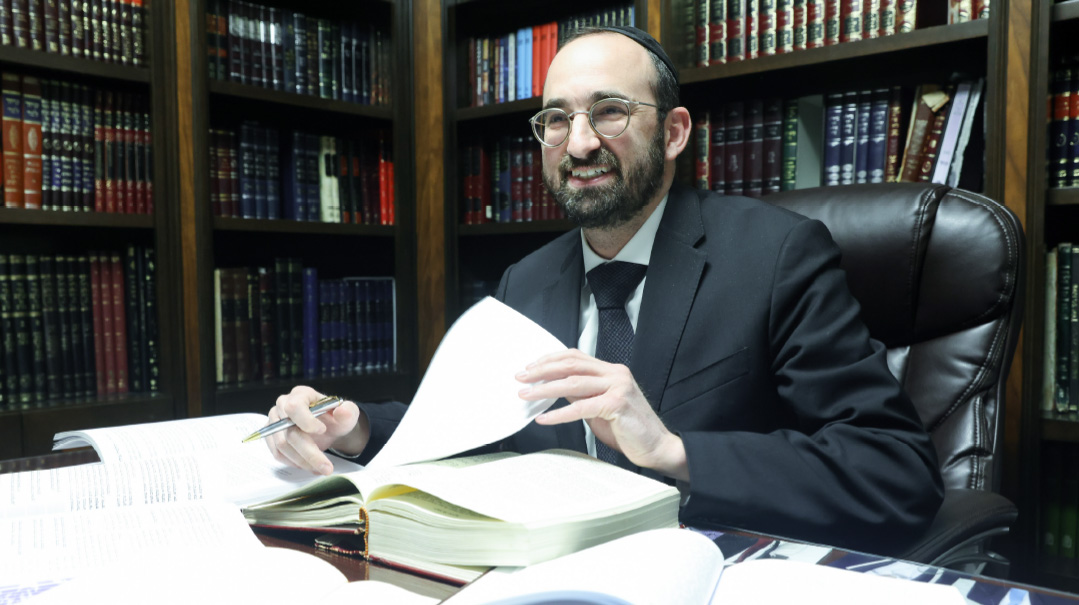
Keeping the Peace
We all know there’s a lot of pressure in the frum world to live with a high standard, and this can cause conflict between couples. What would you advise a husband who comes and complains, “My wife wants me to take her to Florida or Cancun for winter break. But I’m not sure we can afford it and I want to tell her no.”
Rabbi Haber:
We’ve all seen that yesterday’s luxuries have become today’s necessities. For some people today, going away three or more times a year is considered normal. But I don’t want to address materialism here, I want to address the shalom bayis challenge.
The husband can’t magically solve the money issue. But in order to strengthen his marriage, he has to validate his wife, and she in turn has to validate him. In fact, the core solution to most shalom bayis issues — whether they’re about money, frumkeit, parenting, or chinuch — is realizing that both partners want to feel truly understood.
The husband in this case wants his wife to know, “I’m already killing myself trying to make a living. You don’t get what I go through to make a parnassah for us!” On her end, the wife wants her husband to know, “Do you know how much stress I have at home? You don’t understand my need for a break.”
You have to peel off the layers till you get to the core issue of validating each other’s stress. For example, when a husband rails at a credit card bill, what he’s trying to say to his wife is that she doesn’t appreciate how hard he works, while the wife is trying to communicate that the husband doesn’t sufficiently understand the family’s needs.
Once they fully validate their spouse and make them feel truly understood, then together they can come up with options and find a solution that makes everyone happy. Maybe they can buy plane tickets with points, or use someone’s condo for free, or agree to only eat out one meal a day while they’re away. The details will vary for each couple, but the main thing is that they have to show care and understanding for each other, be on the same team, and try to be in sync with each other’s needs.
As illustrated above, materialism sometimes assumes more importance in our lives than it should. What happens when there’s too much preoccupation with gashmiyus? Is there a way out?
Rabbi Haber:
To answer this requires an honest understanding of human nature. You have to acknowledge that a) people want what the people around them have, and b) it’s hard to expect people who have a lot materially to be overly modest about it. Ideally these things wouldn’t be true, but that’s just how it is. Here are a few realistic steps:
It’s hard to be less than the people around you. This is why it’s so important to live with people whose values you share. If you live in a yeshivish neighborhood where everyone is a lamdan, you’ll want to be a lamdan, too. If your neighbor is driving a Porsche, you’ll want one too. People have a natural sense of competition, and they don’t ever want to feel less than their peers. To not acknowledge this is to not acknowledge reality.
If you live in a neighborhood that’s way above you financially, you need to have a strong internal sense of Torah to still feel good about yourself and resist the pull of materialism.
Someone who has little financially may wish for others’ abundance, but it’s important to realize you don’t have the whole picture.
A wealthy person once told me he was walking with his children down an oceanside block featuring magnificent houses, and he told them, “All you see is the outside of the house. You see the lights, the lawn, the elegant architecture. But you know nothing about what’s going on inside. The people who live there might be struggling with health issues, fighting in the family, mental health issues, problems with children. Maybe that house is all they have left after a business failure. In so many cases, the life they’re living is totally not the life you want, even though it looks like it is.”
I’ve met a lot of people who look like they’re leading “The Life,” and then we hear the terrible problems they have. A woman once came to me to speak about the religious level of her children. She lives in an oceanfront property that’s worth a fortune, and she told me, “I wish I was like my sister.” Her sister lives two miles from the shore in a simple home. But this woman envied her sister’s simpler life, and believed it to be happier than her own. Wealth is definitely a brachah, but in many cases someone who doesn’t have it is just as blessed.
Evening Things Out
Married children often have different needs, whether financially or emotionally. How should parents handle this?
Rabbi Haber:
First let’s focus on emotional. As a parent, you need to do your best to get your children to emotional strength. As strange as it sounds, the way to get there is sometimes to treat them unequally. You give each child what he needs, but for one child that means a two-minute phone call, while for another child that means a half-hour conversation.
I know a fellow who has two daughters. One of them is much more high maintenance, the other doesn’t need much. The father doesn’t spend equal amounts on them, but he tells the second daughter, “I haven’t given as much to you because you haven’t needed it. But if you decide you need it, I’m there instantly for you.” The daughter feels she’s getting the same emotional support as her sister.
Now let’s talk about the financial end. If everyone has the same needs and you give all your children the same amount, fantastic. But when their needs are different, that’s when it becomes incredibly complicated.
In a different family I know, with two sons, one son was financially secure while the other son struggled. The father helped set up the struggling son with an easy business that became very successful. Twenty years later, the first son is still resentful because he had to work so much harder, with no one helping him.
If one child is struggling more than the other siblings, you as a parent may need to give more. But if after your help they’re financially in the same place as their siblings, the other siblings will be resentful. Say three of your kids need a house, and two can afford it, but the other can’t. If you go ahead and buy the third one a house that’s just like the others, the siblings will think, Why am I knocking myself out to be able to afford a house, while Tatty just gave them a house on a platter? You can help, but don’t give them everything.
To summarize, when you’re helping one child, you have to be incredibly aware of the resentment it can create, even if it seems fair to you. When you do give more, make sure to articulate why some children get more of certain resources, and others get less. When there are dramatic differences in terms of what children are receiving, keep your help on the modest side.
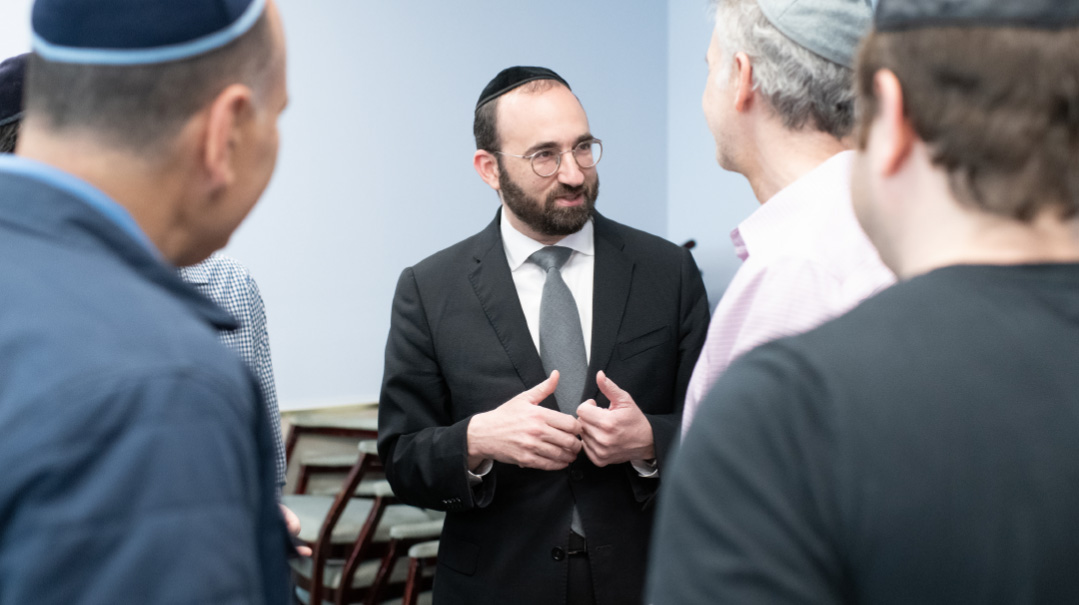
Rabbi Joey Haber learned from his father what real communal devotion means. “I always have this sense that there’s more to be done”
Take Two on Tech
Let’s say you’re a rebbi, and there’s a boy in your class who can’t seem to focus. You’re pretty sure his parents allow him access to all sorts of gadgets and technology at home. How do you deal with it?
Rabbi Haber:
The best way to talk about this with kids is to get them to understand the problem. If this were my class, I’d ask the kids, “What are the positives about technology?” That would throw them off, because they were expecting me to say that everything tech is terrible, and we’d have a discussion. The next day I’d ask what the downsides are, and now they’d be more willing to articulate the struggle because I didn’t come at them harshly.
Here are a few examples. I once asked a class of girls in a modern yeshivah, “How many hours a day do you spend on your phone?” They guessed about two hours.
I asked them to get their phones from the windowsill, where they had to leave them during class, and track how many hours they spent on the phone. They were shocked at the results. For one it was seven hours, another nine, another 15. One student was spending 33 hours a week on TikTok! They couldn’t believe it, but it really got their attention. Now I could say, “So what are you going to do?” By doing it that way, they “got it” on their own.
Another example: My 19-year-old recently told me most of his friends are getting phones.
“Do you want one?” I asked. He said no.
At that moment I realized he had understood it on his own. He himself chapped the problem. Then I said to him, “Once you get one, the slavery begins.” He answered back, “Believe me, I know.”
Here are points a rebbi could talk about with talmidim to make them understand where he’s coming from. Smartphones are designed like slot machines. You keep going to them again and again in the hopes of getting the payoff of a compliment or a joke or a greeting. But then people start checking their phones reflexively, and they almost can’t stop. Ask the student if he could look at the phone on the table with the red light blinking and not pick it up.
Another point: One thing that the kids all understand and relate to today is the issue of anxiety, which has skyrocketed since smartphones and social media came into vogue. There was a study at San Diego University that showed that since the 1960s, anxiety in preteens and teens was increasing maybe two percent a year. After 2011 — the year when a majority of Americans now had social media — anxiety increased by 90 percent in one year! When I speak about this to students, the kids are glued. They totally relate. Recently a boy approached me after a talk and asked if I could help him find a therapist because of this problem.
Catch a Match
Let’s say a child is in shidduchim, but says no to every shidduch that’s suggested. What do you say to a child (or his family) whose expectations are unrealistic?
Rabbi Haber:
Shidduchim are becoming more and more complicated. It used to be easier in the Sephardi community, which is smaller and more closely knit, but the gap is narrowing so that we’ve become more like the Ashkenazim. Any family in the parshah can see a difference between just a decade ago and today.
First let’s talk about if you have a daughter in shidduchim. Number one: It’s very hard for parents to get it right and figure out just how selective they want to be. They have to decide how important each factor is to them and their child — family background, middos, kishronos, hasmadah, wealth, where the couple will live, etc. All these things are reasonable on their own, but you can’t have everything. You need to evaluate how crucial each factor is and pick a couple of priorities, not everything.
Number 2: You need to have a real conversation with your daughter shortly before “the parshah” to see what she thinks she really needs, and what’s most important to her.
Part of what makes it so challenging is that our levels of frumkeit have become more nuanced. There used to be only two categories: You were frum or not frum. Today there are 20 shades of frum. Does he have a phone? Flip phone or smartphone? Smartphone with or without a filter, and if he has a filter, how strong is it? Does he get news on his phone? WAZE? Can he access email? We judge people about these things, and that’s just with regard to phones. Pick your priorities.
On the girls’ side, it feels like it’s really hard to find a boy, but recently I’m seeing people becoming a little more open to “creative” shidduchim that go a little outside the box. They find compatibility on the big issues, and don’t stress the small ones.
Now let’s take it from the boys’ side. The challenge for some boys is that they have too many options. That leads to confusion and paralysis, the same way you can’t choose a shampoo in the supermarket because there are 50 kinds on the shelf. Then when you do choose the shampoo, you start to think maybe you could’ve chosen a better one, which creates such frustration.
Because boys have so many choices, they think they can get perfection, when in reality all they’ll get is a human being. The boy wants this girl’s frumkeit coupled with that one’s intelligence, that one’s looks, that one’s sense of humor, that one’s ability to cook, and that one’s middos. It doesn’t work that way. You’re not going to get it all in the same package. You have to choose the best person for you. The marketing and advertising industries lead us to believe we can obtain everything made to order, overnight — and return it if we aren’t completely satisfied.
When you’re looking through the résumés, it’s a mistake to emphasize “on paper” compatibility. It’s a joke to think you’ll match up on every single variable.
A few years ago, I was asked to be mesader kiddushin for a wedding. At Syrian weddings the rabbi usually speaks under the chuppah. So I asked the couple to come meet with me before the wedding. When we met, they excitedly told me, “We are completely in sync!” They showed me a list where they had written down how they matched in 200 areas of compatibility.
Personally, my shitah is that it’s better for couples to be complementary, rather than totally similar. But they got married, and everything looked perfect. Three months later I ran into the father of the chassan, and he told me they were getting divorced. I’m still scarred from that experience.
But the moral is that it’s the differences in personalities that give energy to a marriage. A cake needs sugar and a little salt to taste good. Marriage is the same. It takes two different people to make a beautiful home. We should embrace differences rather than avoid them. Therefore, a boy needs to know: You’re not looking for perfect, and you’re not looking for someone exactly like you. You’re looking for someone you can work together with to create a bayis ne’eman.
The Best Investment
What do you tell a couple who says they’ve been trying to make their marriage work, but they’re just burned out?
Rabbi Haber:
Many couples are running themselves into the ground trying to manage their lives, but it doesn’t leave them the emotional energy they need to be a good spouse. The men are under a ton of pressure, the women are caring for their husbands and kids, very often working, and in the process, not taking care of themselves. It may sound counterintuitive, but you need to take a little time for yourself to do whatever it is you enjoy. It’s an investment in your marriage.
Spouses have to recharge, individually, but also together. Marriage isn’t just about paying the bills and raising a Torah family. It should be joyful, too. You have to be mechadesh the marriage. You have to do something fun together once in a while, whatever your idea of fun is. After all, it was the joyful moments that got you together in the first place. The joyful moments will keep you together later on, too.
My father likes to say, “Dating is so fake. You have two kids sitting and eating a 100-dollar steak, paid for by his father, and talking about how they’re going to be moser nefesh for Torah.” But having happy moments shouldn’t stop just because now you’re the one paying for that steak. Take a step back from the daily grind and 1) sometimes give yourself your own time, and 2) sometimes spend time together and appreciate each other.
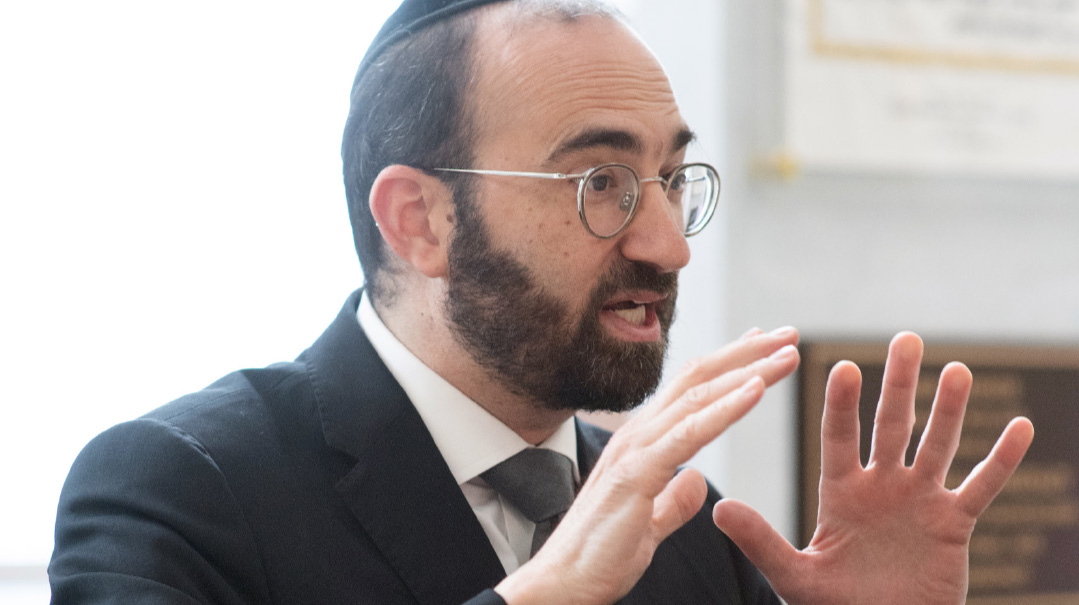
Staying Inspired
You’re a rebbi, and you learn that a group of your former talmidim are now married and living in another town. They’ve been spending their Friday afternoons doing considerably more drinking than learning. How might we get these men back on track, more inspired? Can their parents do anything to influence them?
Rabbi Haber:
The first thing to do is build a relationship, because you can’t influence anyone without a relationship. Today, everything is about relationships. Even in the workplace, the rapport between the boss and the workers is less hierarchical and more collaborative. If you don’t have a relationship with these men, there’s no way you can influence them.
And even if you do have a relationship, you can’t just confront them and tell them to stop drinking. It won’t work. And that’s because of the power of habits.
There’s a book called The Power of Habit, by Charles Duhigg, where he explains that every behavior has a trigger, a behavioral response, and a result.
In the case of these men, the trigger is a long work week which makes the men really tired. Their behavioral response is to hang out with friends and drink, and the result is that they come into Shabbos relaxed and happy.
If you point out to these guys on a Tuesday that this behavior isn’t good, they’ll acknowledge that you’re probably right. But by Friday, that realization won’t hold water, because the same trigger will be there that will cause the habit to happen again to produce the same result. The only way to change the behavior is to replace the habit with a different one that produces the same happy, relaxed feelings.
This was the founding idea behind Alcoholics Anonymous. They realized people weren’t going to bars to drink per se — they were looking for camaraderie. So they organized meetings to create camaraderie without the alcohol. Same trigger, different result.
Same for these men. Maybe they can go to someone’s house to go swimming, and get together for an hour to learn after that, or something else that gives the same result. They’ll have the same fun, the same joy, but obtain it through a better behavior. Now with regard to parents: Parents can try to influence adult children, but again, it depends on the kind of relationship they have with their kids. If the relationship is warm and secure, the parents could talk about it directly. If it’s a less robust relationship, the parents have to be sure to address the issue in a very calm setting, and sometimes the best way is to approach it in question form, with questions that are open rather than challenging.
A father could ask, “What’s the situation with Fridays and shul these days, are you good with it? Are you not good with it?”
A mother whose daughter’s tzniyus has declined could ask, “Do you prefer more trendy outfits? Was that dress your choice — is your husband okay with it? Do you want to go shopping together?” In an open, easy way, you can help her find solutions.
Many people today don’t have a rav, and a shul rav often isn’t the address for hadrachah and eitzah. How can people find and cultivate a relationship with a rav or mentor?
Rabbi Haber:
People have to be willing to do the homework to find themselves the right rav. If you needed a lawyer, you’d check out lawyers to find the right one. If you needed a therapist, you’d shop around. When it comes to a rav, you need to look for someone who you can look up to as a true talmid chacham, and at the same time feel he understands you and your position and stage in life. That will motivate you to seek his advice and to listen to him. Sometimes you can find a rav through a friend who has made similar lifestyle choices and faces similar challenges — the rav he recommends might work for you, too.
I spoke recently in a community in New Jersey that you might describe as “chilled.” But the rav really understands how to tap into his community’s mindset. He made a Torah event on the night of the Super Bowl so that his kehillah could learn instead of watch. He also set up a chavrusa program, and the men have really progressed. Some of them, when they got married, were burned-out bochurim, but they’ve turned into inspired, Torah-oriented balabatim because he was able to reach them at their level.
Raising Them Right
A bochur comes home from his out-of-town mesivta, and his mother finds vaping paraphernalia and cigarettes among his laundry. How should she and her husband handle it?
Rabbi Haber:
The crux of this question is how to motivate your children to be honest with you.
Imagine you just painted your house, and you come home and discover one of the kids took a marker and scrawled all over the wall. You have a pretty good idea which kid is the guilty party.
Now, you can go crazy, and start screaming and accusing the kids. If you do it this way, the kid will learn to lie because it’s uncomfortable to be screamed at. Or you can stay calm, and tell the kids, “I won’t yell or scream, but whoever did this should tell me the truth. There might be a consequence, but I won’t get upset.” (The consequence could be something like cleaning up the mess.)
If you consistently approach misbehavior in this way enough times, the kids will tell the truth, because lying is usually just a means to avoid a harsh reaction or punishment. When your reaction is calm, you train your kids to be honest this way, because honesty won’t be frightening.
A bochur who was smoking will often say to parents who don’t agree with it, “I just tried it the one time.” Most of the time he’s fudging the truth, but if you can make it easy to say the truth, then he will be so much more open with you and you can have a real conversation about smoking and its long-term consequences. Does he want to live to see great-grandchildren, or does he want to raise the odds of taking ten or 20 years off his life because he smokes? Does he want to risk getting in trouble with his yeshivah, or get a reputation as a kid who smokes? Doing it this way is so much more likely to resonate with the child.
Your son comes home from yeshivah upset about the latest gossip regarding a split within a particular chassidus or politics in his yeshivah. He finds it petty and alienating. How do you put it into perspective for him?
Rabbi Haber:
The first thing you need to tell your child is that Klal Yisrael is characterized by tremendous passion and commitment. When we think we’re right, we stand our ground, and it leads to differences of opinion. If two roshei yeshivah split, it’s because each one has his own idea of chinuch and limud haTorah that he believes is the best, and the two of them can’t remain together. Try to help your children understand that often differences are a result of passion.
That said, sometimes people are just human, and an element of negius can interfere with doing things l’Sheim Shamayim. The lesson they need to learn is that we have to watch out for our own biases. On a personal note: When I’m busy and excited with some initiative, and I start to tell myself what a great mitzvah I’m doing, I like to keep in mind a story about a bochur who goes to a rebbi and says, “My rosh yeshivah loves Torah! You should have seen him in yeshivah on Shavuos night. There were 200 bochurim there learning, and he was dancing in the aisle with joy!”
The rebbi responded, “Dancing in his own yeshivah doesn’t show much. If he’d show exactly the same joy dancing in someone else’s yeshivah, then you’d know his ahavas haTorah is authentic.”
I try to always keep this in mind. I ask myself, “Am I excited for this project because it’s for Hashem, or am I excited because I’m the one leading it?” You have to be honest with yourself.
Where disputes are concerned, we have to instill in our children an understanding that very often when there are two great people involved, it’s just that they have two different approaches to avodas Hashem. In other cases, negius can be a dangerous thing.
Your daughter is devastated because she didn’t get the lead in the school production. She won’t get out of bed for two days. Her feelings are real, they’re legitimate. But how can we build our children and ourselves into stronger people when there’s so much focus around us on emotional wounds and trauma?
Rabbi Haber:
As much as we want to protect our children, and give support when they’re suffering, we also have to allow them to endure challenges. We have to allow them to fail.
When your child fails a test, don’t call the teacher and ask him to pass him. If your kid gets in a fight with a friend, don’t call his friend’s parents to resolve it for him. Life will be tough and often disappointing, and it happens to everyone. It’s better that they learn how to deal with it when they’re young.
I once was in the room when someone asked a principal of a modern school how he should handle it if his son didn’t make the basketball team. He asked him if he thought he should speak to the coach or call the school.
The principal answered with an emphatic no. He said the kid needs to learn, and to accept, that there are guys who play better than he does. That’s life. The failure will cause him to work harder or go in a different direction, and both options are to his advantage.
We have to embrace the times when things go wrong. It’s okay to sometimes be hungry, tired, unhappy, discouraged — we’re not supposed to be happy every minute. We were put on earth to toil and to face challenges.
When the young shepherd Dovid approached Shaul Hamelech and offered to do battle with the Golias, Shaul asked, “But how will you be able to do it?”
“Well, once while I was watching the sheep I killed a lion, and I once killed a bear,” Dovid replied. Now imagine that Dovid’s father Yishai would have built high walls around the flocks to protect them from wild beasts, or better yet, told David, “Come inside, it’s too dangerous!” Instead, his chinuch for this situation was to give his son a slingshot. Today, that slingshot is confidence, and confidence doesn’t mean you’re perfect. Confidence means you’ll be fine even though you’re imperfect.
We don’t shelter our kids more than necessary. Our job is to give them the confidence and tools they need to succeed in life, and sometimes that means the ability to deal with failure.
(Originally featured in Mishpacha, Issue 961)
Oops! We could not locate your form.


